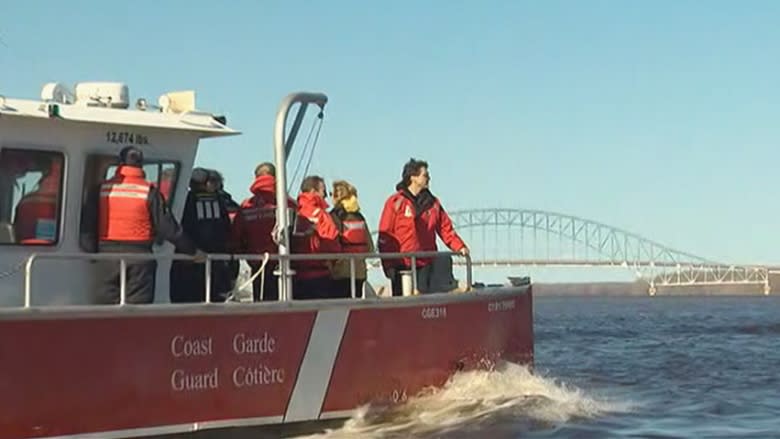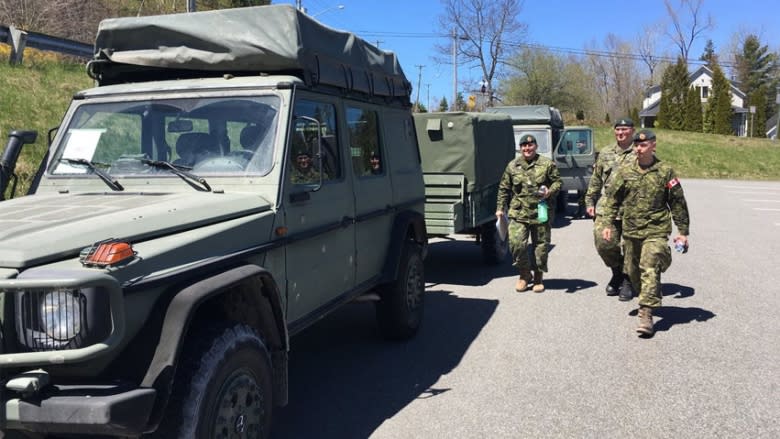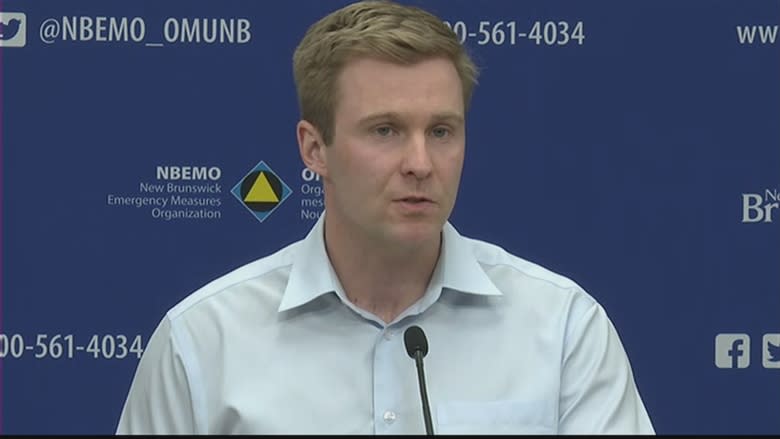Premier's Office faced 'growing pressure from the feds' to ask for flood help
As the St. John River rose to record levels, the Premier's Office was under "growing pressure" to ask for federal help, according to emails obtained by CBC News.
The emails, released through access to information, reveal new details about the optics of asking for Canadian Coast Guard and military help to deal with the worst spring flood in more than 80 years.
On May 2, a week after the river hit flood stage at Fredericton, two unnamed members of Parliament contacted Premier Brian Gallant's chief of staff, Jordan O'Brien, to emphasize "how tired first responders and volunteers are in their regions."
O'Brien said the MPs spoke to the federal ministers of public safety and defence in Ottawa, who were "ready to deploy troops." They questioned why the province hadn't asked them to do so yet.
"We should be prepared to get this question from media soon if we are getting it from MPs," O'Brien wrote, asking whether there was any merit to the idea.
Mike Comeau, New Brunswick's deputy minister of justice and public safety, responded to say the reports from the MPs were "not consistent" with what he was hearing on the ground. He said people were being relieved to avoid exhaustion.
'Growing pressure from feds'
Later that morning, O'Brien emailed other members of the premier's staff, saying he received an email from the minister of fisheries and oceans "eagerly asking us to ask for help." At the time, Dominic LeBlanc was the Minister of Fisheries and Oceans and the Coast Guard.
Comeau responded to say the government did ask for help. But it wasn't a grand request.
"A request has been made at the director level ... wait for it ... for two vessels to relocate 180 head of cattle," Comeau wrote.
"Cattle that EMO advised the farmer four days ago to relocate and chose not to."
O'Brien responded, warning of "growing pressure from the feds to ask them to do things, so that they can say they are doing things."
A look from a helicopter
The next day, the New Brunswick government put out a news release saying the coast guard was providing assistance.
"We are pleased to be able to help in any way we can with flood relief efforts," LeBlanc said in the news release.
On May 5, LeBlanc appeared on a coast guard helicopter in New Brunswick, surveying the flood damage and answering questions alongside the premier.
He also toured flood-affected areas on a coast guard vessel with Prime Minister Justin Trudeau and several Liberal MPs.
No one from the Premier's Office was made available for an interview about the emails.
"We felt it was important for EMO to be aware that the federal government was receiving public pressure to deploy their resources (military and coast guard), but that there was a recognition that any deployment had to begin with a request from the province," spokesperson Tina Robichaud wrote in an emailed statement.
She said the government has always relied on EMO for advice when making decisions on when to ask for federal help during natural disasters.
"In order for them to make the most informed decisions, we try to provide them with information we are privy to," Robichaud wrote.
No one from the Department of Fisheries and Oceans was made available for an interview, either.
In an email, a spokesperson said similar resources were made available to the province of British Columbia to help with Fraser River flooding this past spring.
Asking for help
Throughout the flood, officials from the Emergency Measures Organization rejected calls to ask the military for help, insisting they had enough resources.
EMO had been faced with an ice storm just a year earlier and insisted then, too, that soldiers weren't needed.
But politicians buckled under public pressure to take action and called for military assistance, according to a report on how government handled the 2017 ice storm.
Just two days after a spokesman said military help wasn't necessary, Gallant made the call.
"The premier is now inclined to request military assistance with flood recovery, and he's asked me to brief this group," Comeau wrote to members of the premier's staff on May 9.
It's not clear what changed to persuade the premier to ask for the military's help.
After the premier made the decision, staff weren't sure exactly what kind of help they were supposed to request.
"It's not clear what tasks will be beyond our grasp on which day, and this will be our challenge in requesting assistance," Comeau wrote.
One suggestion was to "advise" the Canadian Armed Forces that it expected not to have enough people or resources to clean up flood debris.
Soldiers inspected roads, bridges
The soldiers never ended up cleaning debris.
About 60 members of the Engineer Support Regiment travelled around flood-affected areas, inspecting roads, bridges and other infrastructure.
Soldiers may have also been asked to transport "government officials in the affected areas," according to an executive briefing.
Even after boots were on the ground, it still wasn't always clear what kind of work the soldiers were doing.
"Do you have a list of what exactly the 60 members of the armed forces are doing as part of the recovery?" Robichaud asked Comeau in an email on May 12, three days after the premier made the call.
"PBG (Premier Brian Gallant) has a couple events this weekend and would like to be able to give a couple examples."




